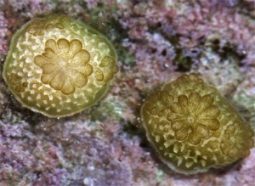The carbon dioxide coral generation
More acidic oceans could mean fewer young corals

The oceans are changing. You can’t tell by standing on a beach and watching waves roll in. But ocean water is becoming more acidic, experiments now show. This process is called “acidification,” and it may mean bad news for animals. One vulnerable animal: the elkhorn coral, which is found throughout the Caribbean Sea.
Elkhorn coral used to be easy to find in shallow water. Now it’s an endangered species. In the last 30 years, many populations of elkhorn coral have collapsed. Disease outbreaks, hurricanes and elevated temperatures may all have played a role. Scientists are working on ways to save the coral, but they have a long way to go. These coral may face yet another threat: In more acidic waters, elkhorn coral are less successful at reproducing sexually, a new study finds.
A substance may be an acid or a base. Acids taste tart and may be corrosive, like vinegar or even battery acid. Bases tend to be slippery. Water is neutral, which means it’s right between acids and bases. Right now, the oceans are slightly more basic than water. But oceans are beginning to move more toward the acidic side.
As acidification worsens, elkhorn coral may produce fewer offspring. That could mean fewer or smaller coral reefs. And that could pose a problem for the many animals and plants that live on those reefs.
Acidification happens because oceans absorb a gas called carbon dioxide from the atmosphere, and carbon dioxide makes the water more acidic. Carbon dioxide, or CO2, in the atmosphere comes from many sources, and human activities have added a significant amount. When we burn oil or gas to generate power (such as electricity or to fuel cars), we add CO2 to the air.
Carbon dioxide is also a greenhouse gas, which means it traps heat in the air — which leads to warmer temperatures on Earth’s surface. This is called global warming, and CO2 is one of many gases that drive global warming.
And since the beginning of the industrial revolution more than 200 years ago, the amount of CO2 in the atmosphere has been increasing quickly. This change in the air has affected the oceans, forcing them to absorb even more carbon dioxide.
Scientists estimate that oceans have become about 30 percent more acidic in the last 200 years. Previous studies have shown that marine animals like corals, oysters and sea urchins have a hard time building their shells and skeletons in more acidic water.
The new study was led by Rebecca Albright. She’s a graduate student at the University of Miami. She wanted to know how elkhorn coral would reproduce in acidic water. To find out, her team added bubbles of carbon dioxide to ocean water in a tank. This made it more acidic — like it will be in the future. The scientists then placed elkhorn coral in the water.
Coral usually grows in reefs. Those reefs often look like giant, colorful rocks in shallow parts of the ocean. They provide a home to many kinds of plants and animals. But coral is neither a rock nor a plant — it’s an unusual animal. Like other animals, elkhorn coral reproduces sexually, which means a sperm cell and egg cell come together to create a new organism.
Albright and her team observed that for coral living in water with extra carbon dioxide, sperm and egg combined less often than they do in ordinary seawater. Then she observed another obstacle to coral reproduction. Even when a sperm and egg managed to join, they had a hard time getting settled on the reef to grow.
As oceans become more acidic, the elkhorn coral may face increasing problems producing offspring. And it’s just one species.
It’s possible that elkhorn coral could evolve and adapt to the changing climate. “One of the limits with this kind of study is that it doesn’t tell you whether there is any potential for evolutionary changes to deal with the new stress,” Steve Gaines told Science News. He is an ecologist at the University of California, Santa Barbara, who did not work on the new study.
In any case, he says, more carbon dioxide means more acidification. And that probably means bad news for the elkhorn coral.
POWER WORDS (adapted from the Yahoo! Kids Dictionary)
acid Any of a class of substances whose aqueous solutions are characterized by a sour taste, the ability to turn blue litmus red, and the ability to react with bases and certain metals to form salts.
evolution The process by which species adapt and change over time.
carbon dioxide A colorless, odorless, incombustible gas formed during respiration, combustion and organic decomposition and used in food refrigeration, carbonated beverages, inert atmospheres, fire extinguishers and aerosols.
coral Any of numerous, chiefly colonial marine polyps of the class Anthozoa.







